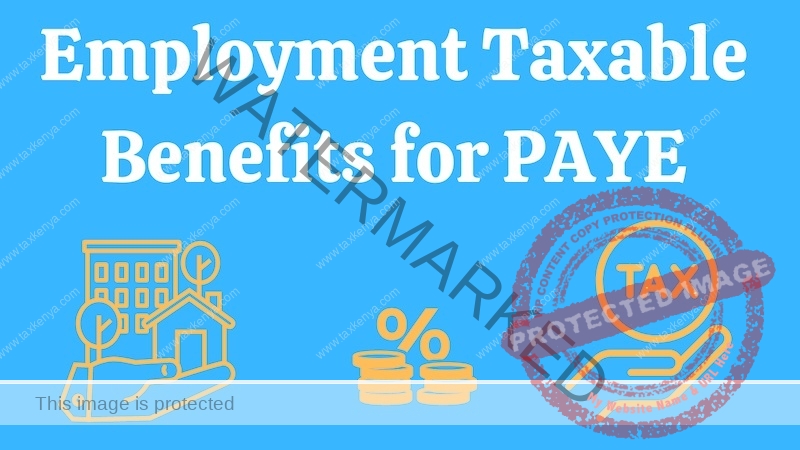Employment taxable benefits for purposes of PAYE is a subject that interest many people. This post examines the tax treatment of twelve employment benefits to employees and directors. The benefits are:
- Benefits with Commissioner’s prescribed rates
- Meals
- Tax-free remuneration
- School fees paid by the employer
- Medical benefits
- Housing
- Passages
- Vehicle benefits
- Vehicle mileage claims
- Fringe benefits
- Reimbursement of expenses
- Retirement contributions by non-taxable employers
Purpose of This Post
This post aims to educate employees, directors, and employers on the tax treatment of the twelve employment benefits to establish the correct PAYE.
Benefits of This Post
It is not enough to learn about the benefits. Implementing what is learned will enable employees, directors, and employers to improve tax compliance, minimize extra tax payments, and minimize tax-related stress.
Introduction
Benefits to employees and directors are compensations for their services over the basic pay. This is the extra payments that employees receive in addition to their basic pay. Employees and directors are compensated with basic pay and benefits in many organizations.
The benefits to employees or directors are in cash or non-cash form.
The benefits to employees and directors consist of non-cash benefits and cash benefits. The classification of whether a benefit is a non-cash or cash benefit is determined by what an employer gives.
Employment Taxable Benefits - Non-Cash Benefits
Non-Cash Benefits
Non-cash benefits are compensation to an employee or director from the employer not in cash but other forms. Examples of non-cash benefits are traveling tickets, Christmas vouchers, Supermarket vouchers, other gift vouchers, foodstuffs, for example, cooking oil, flour, water, etc.
Two essential issues should be considered regarding the taxation of non-cash benefits:
- The current maximum non-cash benefits are shillings 3,000 per employee per month. This is effective from 1 January 2006.
- Any amount of non-cash benefit that is more than shillings 3,000 per employee per month is considered a taxable benefit on the employee in total.
Note that these figures may change in the future.
Employment Taxable Benefits - Cash Benefits
Cash benefit compensations are benefits considered to have been given out by the employer in the cash form. Cash benefits may be received in three ways:
- Cash given directly to an employee or director.
- The employer pays for the employee’s or director’s expenditure.
- Employee or director enjoys a facility or property owned by the employer.

For illustration only I Source Pixabay
Determining the taxable value of Employment Taxable Benefits - cash benefits
There are three ways of determining the taxable value of cash benefits:
- Where cash is given, the tax is on the money provided.
- Where the employer pays for employee’s or director’s expenditure, the taxable amount is determined as either the higher of:
- Actual cost.
- Market rate.
- Commissioner’s prescribed rates.
- Where an employee or director enjoy a facility/property owned by the employer, the taxable amount is determined as either the higher of a. Actual cost, b. Market rate, c. Commissioner’s prescribed rates.
Employment Taxable Benefits - Types of cash benefits
There are many types of cash benefits from an employer. The following are some of the cash benefits to an employee or director from an employer.
a) Benefits with Commissioner’s prescribed rates
These benefits have prescribed rates of taxation set by the Commissioner. The following are the benefit rates per month:
- Communal or borehole water – kshs 500.
- Telephone (landline or mobile) – 30% of monthly bills.
- Electricity (communal or from a generator) – kshs 1,500.
- Furniture – higher of the hired amount or 1% of the actual cost.
Note the rates and items may change.
b) Meals
Previously, meals provided to employees earning less than kshs 29,316 per month (w.e.f 13th June 2008) in cafeterias operated or established in company premises were exempt from taxation. This was irrespective of whether the meals were supplied by the employer or were outsourced.
However, effective 2/10/2014, all employees and directors are allowed non-taxable meal benefits up to kshs 4,000 per month, which is kshs 48,000 per year.
c) Tax-free remuneration
Sometimes, expatriate employees and directors negotiate tax-free compensations for their services. Hence, it is the employer who pays the tax. However, the tax component paid by the employer on behalf of the employee or director is treated as a benefit for the employee. This is referred to as a tax benefit.
This tax-benefit is a taxable benefit. For PAYE purposes, the formula to compute the tax on tax benefit is provided in the PAYE guide. The employer can also determine the tax due using a calculator.
d) School fees paid by the employer
School fees paid on behalf of employees and directors for their dependents are a taxable benefit. However, when the employer pays the tax on the school fees, the school fees are not a taxable benefit on the employee or director as long as the employer pays tax on the amount at the company level.
The school fees are added back when determining taxable profits. However, free or subsidized education by education institutions to their low-income employee’s dependents is not a taxable benefit on the employee, director, or employer. This is with effect from 13th June 2008.
f) Medical benefits
Providing medical services to all employees and directors without discrimination is a non-taxable benefit. However, medical benefits are taxable on the employees and directors if:
- There is no written medical scheme or plan.
- Employees are paid cash for medical services.
- The medical benefits are discriminatory, where some employees or directors are provided with the medical benefits while the rest are not.
The medical benefit is the actual cost. The medical benefit is added to the basic pay and forms part of the gross compensation subject to tax.
g) Housing
Sometimes, companies provide ordinary employees, whole-time service directors, and other directors with housing. The value of the taxable housing benefit is the higher of the following:
- Actual rent paid by the employer.
- 15% of basic pay plus all benefits excluding housing (but including bonus).
- The fair market rent value.
For premises that the employer owns, the benefit is determined as:
- The fair market value.
- The partially occupied part by the employee or director if premises are shared.
- Only for the period occupied by the employee or director if not full-time.
- The benefit excludes furniture and any other items on the premises.
- The benefit excludes amounts recoverable from an employee in the form of monthly rent.
h) Passages
Passages are pay-outs to expatriate workers to go back home every year during their annual leave. Passages paid to expatriate employees, directors, and their families are non-taxable benefits provided:
- The employee or director is not recruited from Kenya.
- The employee or director is not a Kenyan citizen.
- The employee or director is in Kenya to work exclusively for the employer.
- Payments to the employee or director are not made periodically within the year, but they are a one-off payment.
- Payment to the employee or director is not a one-off payment for more than one year.
The employee or director is not free to save or use the payment for other purposes. They must account for the payment by leaving the country.

For illustration only I Source Pixabay
i) Vehicle benefits
Vehicle benefit tax was implemented effective June 9th, 2005. Vehicle benefit is enjoyed from the use of any of the following vehicles:
- Company-owned vehicles.
- Vehicles are not owned by the company but paid for by the company.
- Hired vehicles.
- Leased vehicles.
The vehicle benefits are enjoyed:
- For any period.
- By one person at a time for any single vehicle.
Some factors determine whether using the vehicle by an employee or director is a benefit or not. The following are some of those factors:
- The type of work the employee or director does for the company.
- Exclusive use and allocation of a vehicle.
- Personal use of the vehicle, for example, to and from work and over the weekends by the employee or director.
There are several methods of determining a vehicle benefit to an employee or director. However, the Commissioner can determine the taxable amount if the employee or director fails to prove the use of the vehicle. The following methods are used to determine a vehicle’s benefit to an employee or director. The methods depend on established ownership of the vehicle:
Company-owned vehicles
Sometimes companies assign vehicles for exclusive use by their employees or directors. For example, the managing director’s vehicle, which the company owns, is for exclusive use by the managing director. This includes personal use.
The value of the benefit for the exclusive use of the vehicle by the employee or director is the higher of the following:
- Prescribed rate of 2% per month of the initial actual cost of the vehicle. This is irrespective of the number of years that the company has owned the vehicle.
- Commissioner’s prescribed rates depend on the C.C. rating and type of vehicle. The Commissioner sets these rates to establish the benefits.
Hired vehicles
Companies also hire vehicles for specific periods. When the hired vehicles are used exclusively by particular employees or directors, the actual cost of hiring the vehicles is a taxable benefit to the employee or director. This is because the use of hired vehicles includes personal use.
Leased vehicles
For various reasons, companies sometimes lease vehicles for their employees and directors. If any leased vehicle is for the exclusive use by an employee or director, the use is considered a taxable benefit subject to taxation on the employee or director. The actual cost of leasing the vehicle per month is a taxable benefit.
Company transport services
Some companies provide transportation services for their employees or directors from home to office and back. When the transport is provided as pooled transport service, the cost of providing the transport is not a taxable benefit. It may be treated as a non-cash benefit.
However, when the transport service is provided exclusively to an individual employee or director by the company, this is considered a taxable benefit. The benefit is taxed as the higher of the following:
- Prescribed rate of 2% per month of the initial actual vehicle cost.
- Commissioner’s prescribed rates depend on the C.C rating and the type of the vehicle.
The video is here ...
i) Vehicle mileage claims
Occasionally an employee or director may use their vehicles to work for the company. The employee or director will claim the mileage subject to the same evidence. The mileage claims are allowed and paid for under the following conditions:
- Employees used their vehicles on official duty.
- Vehicle logs are used to record mileage to reimburse mileage costs.
- Receipts and invoices for supplies towards the travel are maintained and lodged with the company. The expenses must have been incurred in the name of the company.
The government allows the use of the Automobile Association (AA) mileage rates for mileage reimbursement. The vehicle mileage claim is not a taxable benefit since it is a reimbursement.
j) Fringe benefits
For taxation purposes, a fringe benefit is the difference between the loan interest rate charged by the employer and the prescribed interest rate by the Commissioner. A fringe benefit is a saving to the employees or directors. The Fringe benefit tax is the tax on the Fringe benefit. The employer pays the Fringe benefit tax at the current corporate tax rate of 30% on the total taxable value each month.
The taxable value is the savings generated due to the difference between the interest rate provided by the Commissioner and the company’s interest rates on loans advanced. The Fringe benefit tax is payable on or before the 9th day of the following month. The prescribed interest rates are published quarterly by the Commissioner.
Fringe benefit tax is payable for all employee’s and director’s loans irrespective of whether the employer is a corporate entity paying income tax or not. For example, income tax exempt Non-Governmental Organisations must pay Fringe benefit tax where applicable.
k) Reimbursement of expenses
Companies reimburse expenses incurred by employees and directors on behalf of the company. Employees and directors may incur expenses such as fueling vehicles, buying books and office stationery, and other supplies to the company. The reimbursed expenses are not treated as cash benefits provided that:
- The expenses are supported by valid third-party documents such as tax invoices.
- The expenses are incurred in furtherance of the business of the employer.
- The supporting documents are in the name of the company.

For illustration only I Source: Pixabay
l) Retirement contributions by non-taxable employers
Not all employers are subject to pay income tax. Many employers are tax-exempt, for example, some Non-Governmental Organizations (NGOs). Some tax-exempt employers contribute to their employee’s or directors’ retirement benefits. Any employee or director contributions by a non-taxable employer to non-registered retirement schemes are treated as taxable benefits.
This is from July 2004. There are requirements that all retirement schemes be registered with the Retirement Benefits Authority (RBA) in Kenya. Besides, any excess contributions to the registered schemes are taxable benefits for the employee or director.
Summary
This post examined the tax treatment of twelve employment benefits to employees and directors. The benefits are:
- Benefits with Commissioner’s prescribed rates
- Meals
- Tax-free remuneration
- School fees paid by the employer
- Medical benefits
- Housing
- Passages
- Vehicle benefits
- Vehicle mileage claims
- Fringe benefits
- Reimbursement of expenses
- Retirement contributions by non-taxable employers
Note the following:
- These are not the only benefits.
- The tax treatment may change.
- Always consult your tax service provider on the latest tax treatment.
This post was on Employment taxable benefits and was brought to you by www.taxkenya.com in our program ‘Let Us Learn Tax’.
OUR CALL!
Remember to:
a. SUBSCRIBE to this Website and YouTube Channel – TaxKenya Shows.
b. LIKE videos on YouTube Channel- TaxKenya Shows.
c. Leave a COMMENT on this Website and YouTube Channel- TaxKenya Shows.
Feel free to send us tax and investments in Kenya questions or topics via email taxkenya@gmail.com that you wish to be covered on this Website.
Remember to:
Dr Wakaguyu wa-Kiburi










